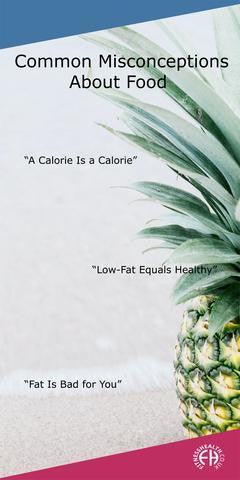
Although food has literally been around since the beginning of man (and woman), there are still many misconceptions about it that can easily lead a person astray when it comes to making good choices regarding what to eat. Let’s go through a few of them now and finally set the record straight.
“A Calorie Is a Calorie”
For the longest time, we’ve been taught that our body weight and whether we gain or lose is based on a simple formula of calories in versus calories out. However, we now know that this is not the case because it is the type of calories that matter most. For instance, you want to eat more calories consisting of protein and fiber than you do calories that come from trans fats. The former are good for your heart and digestive tract where the latter can clog your arteries and shorten your life span.
“Low-Fat Equals Healthy”
With the rise in obesity, there has been this huge push to eat a lot of low-fat foods. The problem with this is that not all low-fat foods are the same. A lot of them are processed (think low-fat snack packs or desserts that are loaded with artificial sugars or lots of sodium to improve the taste) and these aren’t nearly as good for you as natural options like fruit and veggies. So, while low-fat is healthier for you if you are choosing natural food sources, it’s not so good for you if it means you’re eating more pre-packaged foods.
“Fat Is Bad for You”
Speaking of fat, we’ve also been told that fat is bad for us. Period. Yet, now we’re finding that it isn’t that all fat is bad as there are some fats that are actually beneficial to our bodies These include monounsaturated fats like those found in avocados, olives, and nuts. These are actually good for your heart and cholesterol levels so they shouldn’t be nixed from your diet even though they have higher fat content than other lower-fat food sources.









